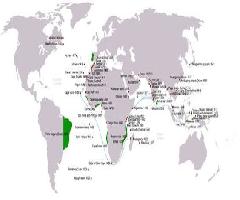The following will discuss the different ideological as well as philosophical beliefs of Karl Marx, and Vladimir Lenin. Marx founded the philosophy and ideology of Marxism, whilst Lenin was to eventually to establish the first Marxist state in the form of the Soviet Union. Lenin, a relatively unknown writer, and political agitator had pledged that he would bring about the first Marxist State at the funeral of Karl Marx's daughter and son in law in 1911. Few took him seriously although events would vindicate his confidence.
In all his writings Karl Marx had implied that proletarian revolutions would be inevitable and
the proletariat would become the ruling class in every country in the world. Karl Marx based his theory of revolution on Hegelian concepts of the dialectic and also the inevitable curse of human history. He argued that his philosophical and ideological aims were to bring about his version of socialism, subsequently known as communism or Marxism.According to the philosophical and ideological arguments written by Marx therefore stated that communism would invariably and ultimately be the final outcome of human economic and social development. Marx’s theory of revolution was thus deterministic in its nature, as he argued that the economies and societies of countries had to reach a certain stage of development before the proletariat revolutions could actually take place, without that development societies would lack the required level of philosophical and ideological maturity.
For Marx the most advanced countries such as Britain, France, and his native Germany would be ready for, and experience their proletarian revolutions before the more backward countries like China, and Tsarist Russia.4 Marx was aware that his ideas had attracted supporters in Russia such as Lenin yet expected them to wait for their revolution to happen when the time was right. Whilst Marx contended that proletarian revolutions could not be avoided or averted his theory of revolution did not given any indication of when such revolutions would actually occur except for vague references to when the economic and social conditions and the time was right.
Marx anticipated that the most advanced capitalist countries in general, and Britain in particular would be only decades away from their proletarian revolution as opposed to backward countries like Tsarist Russia that were potentially two or three centuries away from having successful proletarian revolutions of their own. The thing that Marx’s theory of revolution neglected to mention in suitable depth was how proletarian revolutions would be achieved, he was just convinced that they would happen in every country at some point in time due to the ways in, which economies and societies developed. That neglect was the main philosophical and ideological elements missing from his writings.6 There was therefore plenty of scope for Lenin to improve or pervert Marx’s theory of revolution in 'What is to be Done?' as the theory itself was vague and also open to different interpretations of its meaning and how it would be fulfilled.
The writings of Karl Marx had done a great deal to spread the ideological and political concepts of socialism, communism, as well as what became known as Marxism. Indeed Marx had produced copious amounts of analysis concerning the development and the functioning of the capitalist system, particularly in the meticulously researched ‘Das Kapital’, which claim to highlight the weaknesses of the capitalist modes of economic production.8 Besides as far as Marx was concerned capitalism would sow the seeds of its own destruction just as feudalism had unintentionally led to the emergence of capitalism itself. However it would possible for feudalism, capitalism, and communism to exist at the same time as countries develop at different rates. Those that wanted to experience a proletarian revolution just had to wait for one, if they fortunate enough to live in one of the most advanced countries they would probably not have to wait too long.
It can be plausibly argued that with 'What is to be Done?’ Lenin was able to improve upon Marx’s theory of revolution, and thus his philosophical and ideological concepts. With the writing of 'What is to be Done?’ Lenin gave a greater amount of consideration to the practical steps that were needed to bring about proletarian revolution as soon as possible rather than waiting for decades or even centuries for one to occur once all the predetermined conditions fell into place.
Marx’s theory of revolution was for the patient and those that were safe from persecution for their political beliefs; Lenin was neither patient nor felt safe from the Tsarist authorities and secret police. 'What is to be Done?' was an improvement upon the ideas of Marx concerning revolution as it was meant as a blueprint for Marxist parties everywhere to go out and achieve their own revolutions in the present or the near future. That was better than doing nothing apart from waiting for revolutions to start of their own accord. Lenin contended that proletarian revolution could be achieved when capitalism showed weaknesses, or indeed in times of crisis as that would be apparent before capitalism reached the point of its own collapse. Lenin argued that all Marxist parties had to search for weaknesses in capitalism and then take advantage of all opportunities that are identified to launch proletarian revolutions. Other radical Marxist such as Rosa Luxemburg shared Lenin’s ideas about bringing about revolution in the present.
'What is to be Done?' was thus a considerable improvement upon Karl Marx’s theory of revolution as it urged that all serious Marxist parties and political organisations to adopt a proactive approach or strategy towards achieving revolutions across the globe. Proactive actions rather than passively waiting for human history to take it are proper, and also long drawn out course. Revolutionary opportunities had to be taken whenever, or wherever they have arisen or existed as such chances would not last for too long, which would allow for the reactionary forces of capitalism to resist them. Changes in more backward countries were also resisted by the old feudal order, and have the time to take steps to avoid revolutions in the first place. Lenin argued that it did not matter where or when
the opportunities for successful proletarian revolutions occurred just as long as the relevant Marxist party was able to take full economic, political, and social control of their own country. One successful proletarian revolution could certainly act as a catalyst for further successful revolutions in other countries. As far as Lenin was concerned the strategies that he put forward were theoretically sound as well as being pragmatic, and equated to giving human history a substantial helping hand.Lenin had improved on Marx’s theory of revolution, as 'What is to be Done?' was more of a systematic and coherent work that happened to be more explicit than Marx had been in his philosophical and ideological writing. Whilst Marx had painstakingly analysed the weaknesses of, and the inconsistencies contained within the capitalist system he had not provided guidance on how to overthrow capitalism to bring about communism via revolution.
On the other hand, Lenin did suggest ways to achieve revolution and practical methods for the overthrowing of capitalism to bring about communism ahead of schedule whether it was newly emerging as it was in Tsarist Russia, or more firmly established as it was in Britain, France, and Germany. Lenin decided to write 'What is to be Done?' to suggest ways in which revolutions could be launched rather than just happen as a means to overcome the problems presented by the backwardness of Russia and to explain why the more advanced countries had not experienced proletarian revolutions. Lenin argued that the strategies and tactics he put forward in 'What is to be Done?' were the only effective means of fulfilling Marx’s dreams of achieving successful proletarian revolution and destroying the capitalist system before it enslaved the proletariat forever. Lenin also rejected the peaceful and the constitutional paths to power as preferred by moderate Marxist parties such as the SPD in Germany, and the non-Marxist Labour Party in Britain. Lenin contended that socialism or communism achieved peacefully in liberal democracies would not be a long lasting achievement as capitalist parties could easily reverse any changes simply by winning subsequent elections.
The critics of Lenin argued that the danger of applying the strategies and tactics that Lenin favoured was that they recommended then accelerated the path towards a proletarian revolution without there been any significant numbers of the proletariat being involved in carrying it out. The premature launching of a revolution attempt could indeed be highly detrimental for the long-term prospects of a successful proletarian revolution, as failure could strengthen the forces of repression. There was no need to take excessive risks when all of human history was working towards the final victory of the proletariat in any case.
The more orthodox Marxists argued that it was their duty to educate the proletariat in their respective countries to embrace the concepts of communism and work towards achieving revolution as well as winning the class war when the moment was right to do so. Lenin’s insistence that his party should carry out a revolution whenever it could irrespective of the readiness or even the support of the majority of the Russian proletariat perverted Marx’s theory of revolution.18 Lenin would further enrage his critics by working towards gaining the support of the Russian peasants in order to take power whenever the opportunity arose to do so. After all the vast majority of the Russian population at the start of the 20th century was made up of illiterate peasants. With only very small numbers of the middle classes and even fewer members of the proletariat, it made the prospects for a successful revolution appear to be very remote indeed. Thus Tsarist Russia according to Marx’s own ideas about revolution would take decades at least to have a proletariat large enough to successfully take power.
There were also arguments that Lenin’s 'What is to be Done?' perverted Marx’s theory of revolution as it would bring about regimes if it proved to be a successful strategy that were not truly proletarian or communist in their composition and their actual policies. The strategies and the tactics favoured by Lenin in 'What is to be Done?' would lead to nominally proletarian regimes that did not have any or only a few members of the proletariat within their ranks. The Leninist approach would not lead to the foundation of authentic Marxist states, only to regimes that pretended to be communist. By successfully carrying out the policies included within 'What is to be Done?’ Lenin would create a dictatorship that would only cater for the needs of the party leadership rather than looking after the interests of the proletariat. The other problem was that if successful Lenin would have to carry out economic policies that would greatly expand the size of the proletariat after gaining power otherwise the communist regime would only rule to help itself.
Bibliography
Eatwell R & Wright A (2003) Contemporary Political Ideologies 2nd Edition, Continuum,
London
Harvey R, (2003) Comrades – the rise and fall of World Communism, John Murray, London
Hobsbawm, E (1994) Age of Extremes, the Short Twentieth Century 1914-1991, Michael Joseph, London
James, H (2003) Europe Reborn – A History, 1914 – 2000, Pearson Longman, Harlow
Lenin, (1902) 'What is to be Done?'
Lichtheim G, 'Marxism'
Wheen F, (1999) Karl Marx, 4th Estate, London
Woodruff W, (2005) A concise history of the Modern World, Abacus, London
K. Marx and F. Engels, Communist Manifesto
(http://www.anu.edu.au/polsci/marx/classics/manifesto.html)
K. Marx, The Eighteenth Brumaire of Louis Bonaparte
H. Selsam and H. Martel (editors), Reader in Marxist Philosophy

